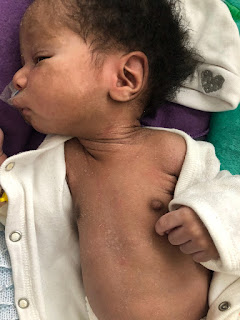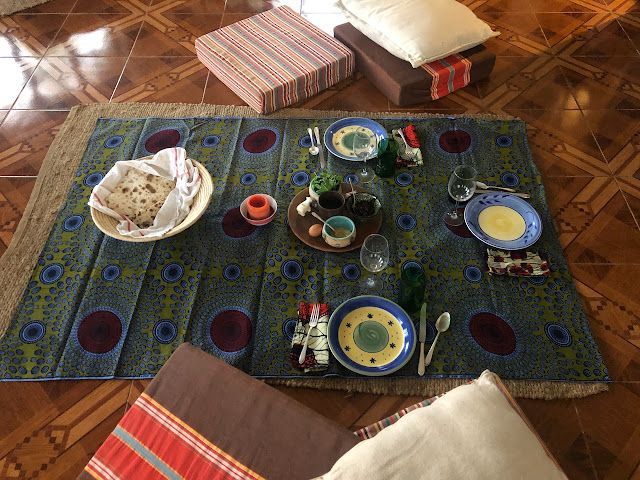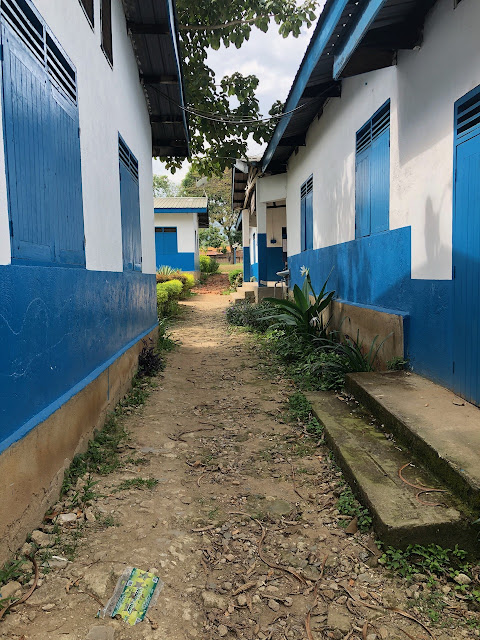While this news article is enough to make anyone pause--large numbers, dire warnings--it was the stock file photo that caught my attention. This looks like my mom and sister. It is NOT, but it could be.
My sister had a birthday Sunday, and like all birthdays in this era, she cooked her own dinner and went on a socially spaced walk, while caring for her husband and son and receiving greetings by facetime. She's a hard-working woman who serves others. My mom, and Scott's mom, are troopers staying carefully low-profile, in their homes. For weeks. And more weeks. They are resilient octogenarians with a good grasp of science and a willingness to sacrifice. It's been a marathon and it's not over. One of our kids came home to police cars on the street; the next day the neighbors told him that one of their room-mates shot himself. The toll from the virus and from the fear and isolation is high in our country of origin. Much of America has experienced excess deaths from mid-March to mid-April, half known coronavirus and half unexplained (some actually are coronavirus but not known because of lack of testing and diagnosis or choice to remain home rather than be alone in a hospital, others are fear of accessing health care leading to late presentations of other common illness, dysfunction of parts of the overwhelmed health system, or coronavirus insidious effects that we have yet to delineate, or the mental health strain of a restricted existence, so many factors). A few areas have actually seen fewer deaths as roads emptied and crime plummeted. The models spoke of the hammer and the dance; we have been hammered with restrictions and they flattened even the steepest NYC curve. Now we are asking how to dance, how to ease up a little and see what happens. Cuomo today talked of cautiously opening valves and reading dials. Soon some places will relax restrictions, and then cautiously watch.
The world hit 3 million diagnosed cases. Uganda hit 79. Tomorrow will be 40 days in the wilderness for us, longer for some others.
There is no way to know if opening the schools, or the restaurants, or manufacturing will do more good, or more harm. There is some evidence that the closures did some good. But the evidence is still to be gathered, the conclusions still to be drawn. We're living in the middle of the largest scale experiment of our lifetimes, and we don't have the answers. This is how science works. We observe. We think and ask questions. We design ways to get answers by setting up intervention and control groups. We gather data. We analyse. It takes time. There are truths that are given by God and handed to us by our traditions, of which we need to remind ourselves. My favorite this week was posted by Eric McLaughlin: " The final secret, I think, is this: that the words "you shall love the Lord your God" become in the end less of a command than a promise. - Frederick Buechner". I would add, love your neighbor as yourself to that. These truths remain a bedrock, and through this enforced time of restricted options, we are coming face to face with their necessity and comfort. And there are truths we have to discover like the relationship between force and velocity, or between virae and death.
So as I look at that picture and imagine my mom and my sister, separated by glass, wearing masks, wondering what is true, let's remind ourselves to rest on both kinds of truth. Base your actions on facts proven by peer-reviewed science. And base your actions on the truth that loving God and loving your neighbor are in the end what matters. Love requires sacrifice. My heart is pained by the fingers on the glass. But that picture of separation is not the end of the story. Here is one more quote from a Rohr meditation today:
To heal from our suffering—not merely to ease or palliate it, but to transform it into the source and substance of our growth and wisdom—requires a journey through it.
Here we go, on towards day 40.
My sister had a birthday Sunday, and like all birthdays in this era, she cooked her own dinner and went on a socially spaced walk, while caring for her husband and son and receiving greetings by facetime. She's a hard-working woman who serves others. My mom, and Scott's mom, are troopers staying carefully low-profile, in their homes. For weeks. And more weeks. They are resilient octogenarians with a good grasp of science and a willingness to sacrifice. It's been a marathon and it's not over. One of our kids came home to police cars on the street; the next day the neighbors told him that one of their room-mates shot himself. The toll from the virus and from the fear and isolation is high in our country of origin. Much of America has experienced excess deaths from mid-March to mid-April, half known coronavirus and half unexplained (some actually are coronavirus but not known because of lack of testing and diagnosis or choice to remain home rather than be alone in a hospital, others are fear of accessing health care leading to late presentations of other common illness, dysfunction of parts of the overwhelmed health system, or coronavirus insidious effects that we have yet to delineate, or the mental health strain of a restricted existence, so many factors). A few areas have actually seen fewer deaths as roads emptied and crime plummeted. The models spoke of the hammer and the dance; we have been hammered with restrictions and they flattened even the steepest NYC curve. Now we are asking how to dance, how to ease up a little and see what happens. Cuomo today talked of cautiously opening valves and reading dials. Soon some places will relax restrictions, and then cautiously watch.
The world hit 3 million diagnosed cases. Uganda hit 79. Tomorrow will be 40 days in the wilderness for us, longer for some others.
There is no way to know if opening the schools, or the restaurants, or manufacturing will do more good, or more harm. There is some evidence that the closures did some good. But the evidence is still to be gathered, the conclusions still to be drawn. We're living in the middle of the largest scale experiment of our lifetimes, and we don't have the answers. This is how science works. We observe. We think and ask questions. We design ways to get answers by setting up intervention and control groups. We gather data. We analyse. It takes time. There are truths that are given by God and handed to us by our traditions, of which we need to remind ourselves. My favorite this week was posted by Eric McLaughlin: " The final secret, I think, is this: that the words "you shall love the Lord your God" become in the end less of a command than a promise. - Frederick Buechner". I would add, love your neighbor as yourself to that. These truths remain a bedrock, and through this enforced time of restricted options, we are coming face to face with their necessity and comfort. And there are truths we have to discover like the relationship between force and velocity, or between virae and death.
So as I look at that picture and imagine my mom and my sister, separated by glass, wearing masks, wondering what is true, let's remind ourselves to rest on both kinds of truth. Base your actions on facts proven by peer-reviewed science. And base your actions on the truth that loving God and loving your neighbor are in the end what matters. Love requires sacrifice. My heart is pained by the fingers on the glass. But that picture of separation is not the end of the story. Here is one more quote from a Rohr meditation today:
To heal from our suffering—not merely to ease or palliate it, but to transform it into the source and substance of our growth and wisdom—requires a journey through it.
Here we go, on towards day 40.




























































